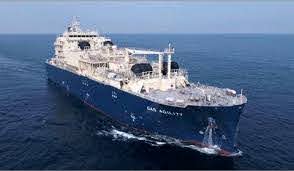
BioLNG production project at a French port
EveRé, operator of the multi-process household waste treatment plant commissioned by Métropole Aix-Marseille-Provence, the CMA CGM Group, a world leader in shipping and logistics, Elengy, a subsidiary of Engie, operating liquefied natural gas (LNG) terminals at Fos-sur-Mer and TotalEnergies, a global multi-energy company that produces and supplies energy, have joined forces to study the feasibility of creating France’s first production unit for liquefied biomethane (BioLNG), a low-carbon alternative fuel dedicated to energy transition in the shipping industry.
Produced by converting the biodegradable part of household waste from the Marseille Provence region, BioLNG would allow for the decarbonization of shipping services departing from the Grand Port Maritime in Marseille and would be used primarily for the CMA CGM Group’s LNG-powered vessels.
The project forms a circular economic system. Using the area’s household waste will help reduce local air pollutants (nitrogen oxides, sulfur oxides and fine particles), improving air quality and quality of life for people living in the region and supporting the energy transition in the shipping industry.
A concrete commitment to energy transition in shipping
BioLNG, combined with the dual-fuel gas engine technology developed by CMA CGM, reduces greenhouse gas emissions (including carbon dioxide) by at least 67% relative to well-to-wake VLSFO (the complete value chain). On the basis of a tank-to-wake measurement (at vessel level), greenhouse gas emissions are reduced by 88%.
Liquefied natural gas allows for a 99% reduction in sulfur oxide emissions, a 91% reduction in fine particles emissions and a 92% reduction in nitrogen oxide emissions. By the end of 2024, 44 of the CMA CGM Group’s vessels will be powered by LNG.
A project integrated into the local ecosystem
The project fits perfectly into the local ecosystem, benefiting from the particularly well-suited and already existing infrastructure at the Grand Port Maritime, including EveRé’s waste methanization unit, Elengy’s LNG terminals, which will be used for the storage and delivery of the BioLNG, TotalEnergies’ bunker vessel, which will be located at the port as of January 2022, and CMA CGM’s fleet of LNG-powered vessels. The feasibility study has been launched within the framework of this large-scale project, which corresponds with the national drive to promote BioLNG as defined in France’s Mobility Orientation Law.
Information Source: Read Full Release ..–>

